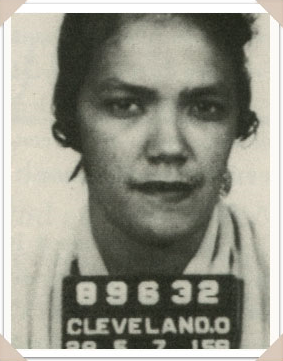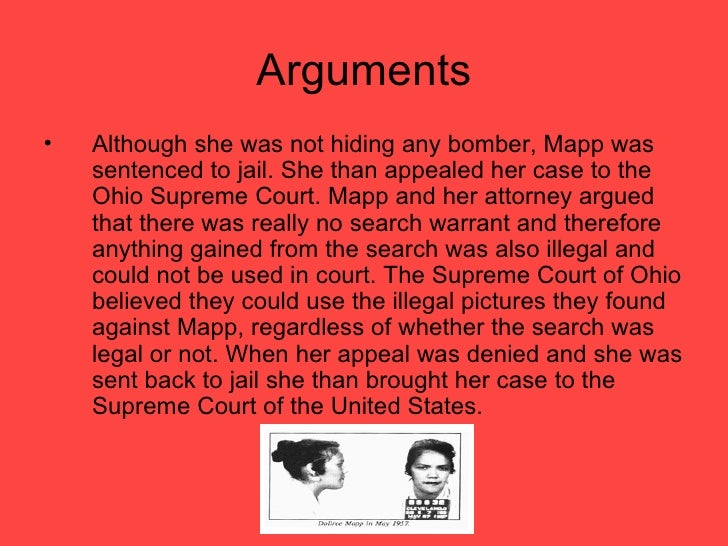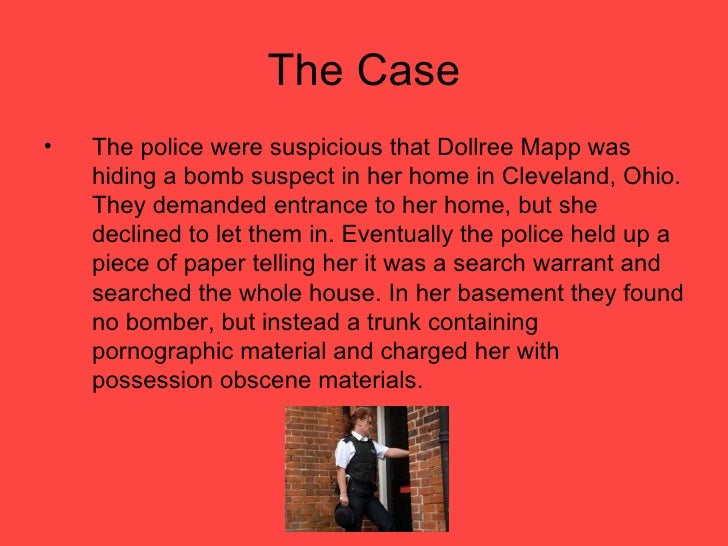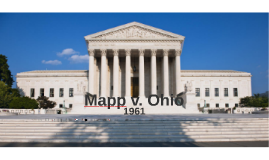BE SURE TO WATCH IN HD Just a fun project for my Advanced Placement United States Government and Politics Class AP US GoPo. March 29 1961 Decided.
She based her claim on First Amendment grounds saying that she had a right to possess the materials.

Mapp v ohio 1961. They arrested Mapp and charged her with violating an Ohio law against the possession of obscene materials. Ohio 1961 Issue. All evidence obtained by searches and seizures in violation of the.
Mapp appealed against her sentence and reached the Supreme Court in March 1961. The exclusionary rule applies to the states through the Fourteenth Amendment due process clause. Does the fourteenth amendment apply the exclusionary rule to State Cases.
On March 1 1961 President John F. Evan Joseph and John Dooley Mapp v. Dollree MAPP etc Appellant v.
Whether states had adopted the. Rehearing Denied Oct9 1961. Has since been modified by decisions of the Burger Court including Nix v.
Ohio United States Supreme Court 1961 Case Summary of Mapp v. Whether or not using the evidence found in Mapps home during an unauthorized search in court violates the 4th Amendment. According to the Supreme Court opinion in Mapp v.
Effect Primary Source Mapp appeals to. Decided June 19 1961. As you can see this year had many important events happen that shaped the countrys future.
Supreme Court on June 19 1961 ruled 63 that evidence obtained in violation of the Fourth Amendment to the US. Sources we used Wikipedia Legal information Institute Mapp V. Ohio reached the Court in 1961 it was not initially seen as a Fourth Amendment case.
On April 20 1961 Fidel Castro announces that the Bay of Pigs invasion has been defeated. Dollree Mapp was convicted under Ohio law for possessing lewd lascivious or obscene material Mapp appealed her conviction. Argued March 29 1961.
Kennedy estavlishes the Peace Corps. Here my group Name. Did the police have the right to search the house of Mapp.
When asked about the warrant the prosecutor for Cleveland deflected the question and was not pressed further on the matter. Leon 1984 good faith. The decision launched the Court on a troubled course of determining how and when to apply the exclusionary rule.
Ohio case in which the US. As a result of their search the police found a trunk containing pornographic materials. Ohio 1961 is the 109th landmark Supreme Court case the fifteenth in the Criminal Rights module featured in the KTB Prep American Government and Civics series designed to acquaint users with the origins concepts organizations and policies of the United States government and political system.
Dollree Mapp I believe that there is a suspected bombing fugitive in your house. Only a handful of states had adopted the exclusionary rule by legislation or judicial opinion. The police force believed that the 4th amendment only applied to federal agents.
Ohio was a 1961 landmark Supreme Court case decided 63 by the Warren Court in which it was held that Fourth Amendments protection against unreasonable searches and seizures applied to the states and excluded unconstitutionally obtained evidence from use in state criminal prosecutions. Williams 1984 inevitable discovery rule and US. After failing to gain entry during the first visit the officers.
Ohio 1961 Infoplease Under the US constitution about the 4th Amendment The police must have probable cause and a warrant signed by a judge in which the. Justices Black and Douglas concurred. She was found guilty in court and sentenced to jail.
United States Supreme Court MAPP v. It is illegal to h. Ohio 1961 Cause Ohio police enter Dollree Mapps house on suspicion of harboring a fugitive and arrest her for possession of obscene materials.
During the case the Warrant which Mapp has taken and police had taken back never surfaced as evidence for either side. The 50-year development of the exclusionary rule for illegal evidence begun in the Weeks case 1914 and continued in Elkins 1960 culminated with the decision reached in Mapp 1961. Justice Stewart concurred in the judgment but agreed fully with Part I of Justice Harlans dissent and expressed no view as to the merits of the constitutional issue.
Constitution which prohibits unreasonable searches and seizures is inadmissible in state courts. Police sought a bombing suspect and evidence of the bombing at Mapps house. After losing an appeal to the Ohio Supreme Court Mapp took her case to the US.
Ohio 1961 involving a police search for a bombing suspect.
 Dollree Mapp Who Defied Police Search In Landmark Case Is Dead The New York Times
Dollree Mapp Who Defied Police Search In Landmark Case Is Dead The New York Times
 Can The Police Use Evidence They Got Illegally Mapp V Ohio Youtube
Can The Police Use Evidence They Got Illegally Mapp V Ohio Youtube

 4th Amendment The Papers Of Justice Tom C Clark Tarlton Law Library At Tarlton Law Library
4th Amendment The Papers Of Justice Tom C Clark Tarlton Law Library At Tarlton Law Library





